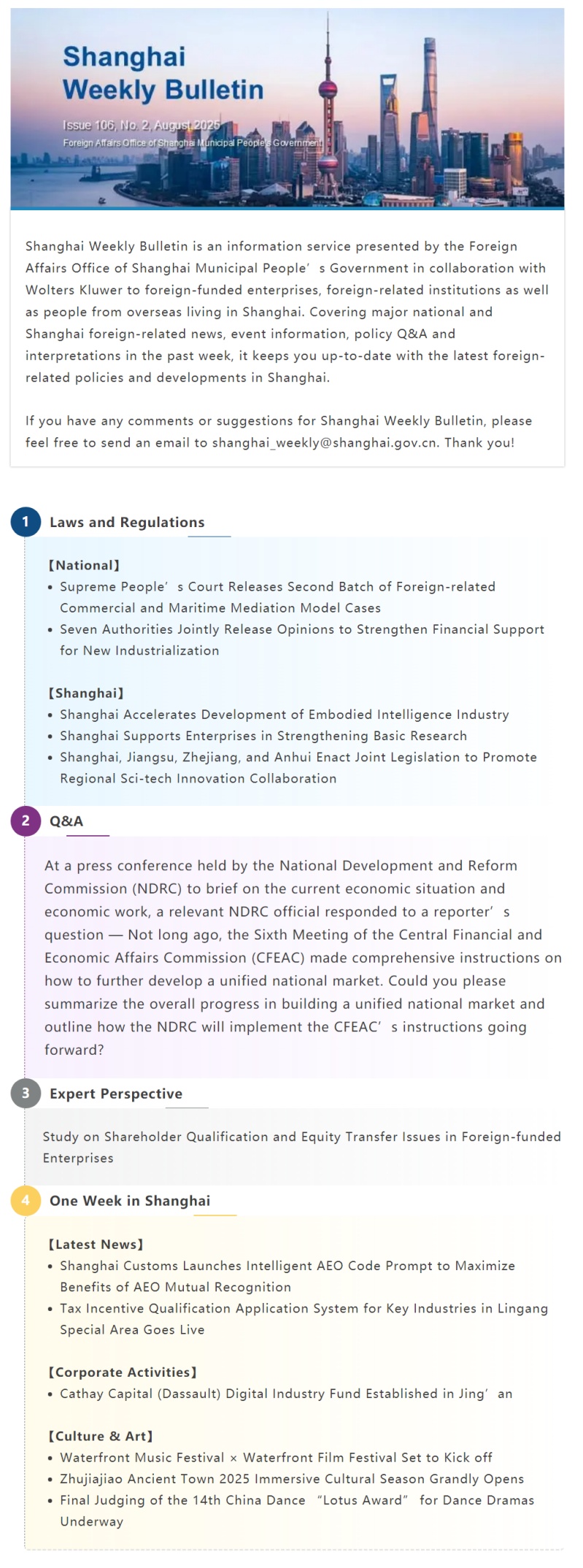Shanghai Weekly Bulletin (Issue 106 No.2, August 2025) ( 2025.08.13 )

Laws and Regulations
National
1.Supreme People’s Court Releases Second Batch of Foreign-related Commercial and Maritime Mediation Model Cases
[Keywords: Foreign-related, Maritime]
On August 7, the Supreme People’s Court released its second batch of model mediation cases concerning foreign-related commercial and maritime disputes. Involving parties from eight different countries, these cases demonstrate the ability of Chinese courts to achieve efficient, harmonious, and substantive resolution of foreign-related commercial and maritime disputes through mediation.
Source: Supreme People’s Court
https://www.court.gov.cn/zixun/xiangqing/473101.html
2.Seven Authorities Jointly Release Opinions to Strengthen Financial Support for New Industrialization
[Keywords: Finance, New industrialization]
The People’s Bank of China, together with six other authorities, recently issued the Guiding Opinions on Financial Support for New Industrialization. Aligned with key sectors of new industrialization, the document outlines 18 targeted supportive measures across six key areas.
Source: People’s Bank of China
http://www.pbc.gov.cn/goutongjiaoliu/113456/113469/5801445/index.html
Shanghai
1.Shanghai Accelerates Development of Embodied Intelligence Industry
[Keywords: Embodied intelligence]
The General Office of the Shanghai Municipal People’s Government recently issued the Implementation Plan for the Development of the Embodied Intelligence Industry in Shanghai. The plan features 24 targeted measures across five strategic dimensions, namely, driving model innovation, establishing public platforms, piloting benchmark applications, fostering collaborative cluster-chain development, shaping a premier ecosystem. The plan came into effect on July 28, 2025, and remains valid through July 27, 2028.
Source: Shanghai Municipal People’s Government
https://www.shanghai.gov.cn/nw12344/20250806/f9cb53544505426d807055ca20bd69fc.html
2.Shanghai Supports Enterprises in Strengthening Basic Research
[Keywords: Basic research]
The General Office of the Shanghai Municipal People’s Government has recently issued Several Measures to Support Enterprises in Enhancing Basic Research and Boosting New Momentum for High-quality Development. The document proposes granting a one-off financial subsidy to enterprises whose investment in basic research reaches a specified amount. The policy took effect on August 1, 2025, and will remain in force until July 31, 2030.
Source: International Services Shanghai
https://english.shanghai.gov.cn/en-Latest-WhatsNew/20250806/8c1ce884538843febe917c5863b1d854.html
3.Shanghai, Jiangsu, Zhejiang, and Anhui Enact Joint Legislation to Promote Regional Sci-tech Innovation Collaboration
[Keywords: Sci-tech innovation]
Recently, the Legislative Work Committees of the Standing Committees of the People’s Congresses of Shanghai Municipality, Jiangsu Province, Zhejiang Province, and Anhui Province jointly held a press conference to announce the unified release of the Decision on Promoting Coordinated Development of Sci-tech Innovation in the Yangtze River Delta, which had been separately adopted by the Standing Committees of the People’s Congresses of the three provinces and Shanghai municipality. The decision, which will take effect on September 1, 2025, is the first legal decision in the Yangtze River Delta formulated in the form of coordinated legislation to address science and technology innovation collaboration.
Source: Shanghai Municipal People’s Congress
Q&A
At a press conference held by the National Development and Reform Commission (NDRC) to brief on the current economic situation and economic work, a relevant NDRC official responded to a reporter’s question
Q
Not long ago, the Sixth Meeting of the Central Financial and Economic Affairs Commission (CFEAC) made comprehensive instructions on how to further develop a unified national market. Could you please summarize the overall progress in building a unified national market and outline how the NDRC will implement the CFEAC’s instructions going forward?
A
Developing a unified national market is a major decision made by the CPC Central Committee. In recent years, relevant parties have earnestly implemented the Opinions of the CPC Central Committee and the State Council on Accelerating the Development of a Unified National Market and its supporting measures, achieving positive results in three main aspects. First, the fundamental framework has been basically established, with basic market systems gradually improving, market infrastructure continuously enhanced, and the flow of factors becoming smoother. Second, social consensus has been significantly strengthened, with the concept of fair competition taking deep root. From central government departments to local authorities, and from enterprises to all sectors of society, there has been a marked increase in initiative and enthusiasm to integrate into and serve the unified national market. Third, the benefits of this initiative have become increasingly evident. The unified national market is playing a greater role in pooling resources, boosting growth, encouraging innovation, optimizing division of labor, and promoting competition. As introduced earlier by Director Jiang, in the first half of this year, the ratio of total social logistics costs to GDP fell by 0.2 percentage points compared with the same period last year. Two additional sets of data further illustrate the progress: from January to April this year, inter-provincial trade sales accounted for 40.4% of total sales revenue nationwide, up 0.6 percentage points year-on-year; secondly, in the first half of the year, cross-provincial electricity transactions increased by 18.2% year-on-year, with their share in market-based electricity trading rising by 2.6 percentage points. These figures, from different perspectives, reflect a reduction in market transaction costs and more efficient allocation of factors of production and resources on a larger scale.
At the same time, we remain acutely aware that the achievements in building a unified national market still fall short of the requirements set by the CPC Central Committee and the State Council, as well as the expectations of various stakeholders. Significant challenges remain ahead. Going forward, the NDRC will diligently implement the guiding principles of the Sixth Meeting of the CFEAC. Guided by the core principles of “five unifications and one openness”, we will concentrate efforts on addressing key and pressing challenges. Through more forceful and effective measures, the NDRC will ensure the full implementation of all instructions aimed at advancing the construction of a unified national market.
Firstly, strengthening overall coordination. The NDRC will leverage its leading role to formulate a comprehensive action plan for deepening the unified national market, coordinating with all relevant stakeholders to ensure seamless implementation of priority tasks.
Secondly, enhancing institutional frameworks. Key focus areas include harmonizing systems for property rights protection, market access, fair competition, social credit, and quality standards. We will further standardize government conduct by establishing a Prevention List for Actions Undermining Market Unity and Fair Competition, and improve fiscal and taxation systems, statistical accounting mechanisms, and evaluation frameworks that support the development of a unified market.
Thirdly, targeting key sectors. We will deepen reforms that promote the market-oriented allocation of factors. Strategies include refining the unified national electricity market system, fostering a nationwide integrated data market, and advancing the coordinated development of a unified and open transportation services market.
Fourthly, rectifying market irregularities. We will clamp down on disorderly competition among enterprises in accordance with laws and regulations, advance capacity management in key industries, standardize bidding and tendering processes, strengthen fairness reviews of bid results, regulate local investment promotion practices, enhance disclosure of investment information, and earnestly carry out the clearance and rectification of market access barriers. It is particularly important to emphasize that we will establish and improve a regular mechanism for collecting, investigating, interviewing, and reporting issues. Typical negative cases will be publicly reported, and those of a serious nature will be referred to relevant authorities for strict accountability.
Source: NDRC
https://www.ndrc.gov.cn/xwdt/wszb/jddqjjxshjjgz/
Expert Perspective
Study on Shareholder Qualification and Equity Transfer Issues in Foreign-funded Enterprises
By Cai Shuo, Xing Jingyu, and Tian Yaqi (Beijing Jincheng Tongda & Neal Law Firm)
[Continued from the Previous Issue]
III. Approval and Filing Requirements for Equity Transfers by Shareholders of Foreign-funded Enterprise
Under the previous "Three Foreign Investment Laws", which established a comprehensive approval system, equity transfer contracts of foreign-funded enterprises only took effect after approval by the competent authorities. Without such approval, a People’s Court would deem the agreement invalid, which could further prevent the transferee from asserting shareholder rights under the equity transfer agreement. Even before the agreement took effect, a party who failed to apply for approval was considered to have breached the principle of good faith and would face negative legal consequences.
Since October 1, 2016, the foreign investment management system has shifted from a comprehensive approval system to a general filing system combined with an approval system for industries on the negative list. Specifically, equity transfer contracts of foreign-funded enterprises outside the foreign investment negative list are now subject to the filing system. This filing is of a declaratory nature and no longer constitutes a condition for the validity of contracts. Consequently, such contracts are valid and effective even without prior government approval. Moreover, any contractual provision stating that the contract takes effect only upon approval by the authorities no longer serves as a condition for validity.
As per Supreme People’s Court Case (2021) No. 1074, the Supreme People’s Court holds that following the implementation of the Foreign Investment Law and its Implementing Regulations, the Law of the People’s Republic of China on Sino-foreign Equity Joint Ventures, the Law of the People’s Republic of China on Wholly Foreign-owned Enterprises, the Law of the People’s Republic of China on Sino-foreign Cooperative Joint Ventures, along with their implementing regulations or rules, have been concurrently repealed. The approval and filing systems stipulated in these repealed laws and administrative regulations are no longer applicable. Therefore, although the relevant legal acts occurred before the implementation of the Foreign Investment Law, if the disputed equity transfer registration of the foreign-funded enterprise does not fall within the scope of management of the negative list referred to in Article 4 of the Foreign Investment Law, the People’s Court shall, in accordance with the principles of “national treatment” and “equal treatment of domestic and foreign investment”, reject any claims that approval from foreign investment authorities was required.
As indicated by the Supreme People’s Court case, when shareholders conduct equity transfers, they should first determine whether the company’s business scope falls within the negative list under the Foreign Investment Law. If it does, approval from foreign investment authorities remains necessary to avoid validity defects in the acquisition of shareholder status.
[To be Continued]
One Week in Shanghai
Latest News
1.Shanghai Customs Launches Intelligent AEO Code Prompt to Maximize Benefits of AEO Mutual Recognition
[Keyword: AEO]
To help Authorized Economic Operator (AEO) certified enterprises more accurately and efficiently enjoy the convenience brought by AEO mutual recognition in international customs clearance, Shanghai Customs, in collaboration with the Shanghai Municipal Commission of Commerce (Port Office), has pioneered an intelligent AEO code prompt function on the Shanghai International Trade “Single Window” platform. This function uses smart technology to enable a three-step process — precise identification, automatic prompts, and accurate data entry — which helps enhance enterprises’ ability to fully leverage AEO mutual recognition benefits.
Source: Shanghai Customs 12360 Hotline
2.Tax Incentive Qualification Application System for Key Industries in Lingang Special Area Goes Live
[Keywords: Income tax, Incentive qualification]
Recently, the Shanghai Municipal Commission of Economy and Informatization (SHEITC) issued the Announcement of the Launch of the “Income Tax Incentive Qualification Application Management System for Key Industrial Enterprises in Lingang Special Area of China (Shanghai) Pilot Free Trade Zone”. The system officially went live on August 1, 2025. It can be accessed at https://sdsyh.sheitc.sh.gov.cn/sdsrd/manage/login.
Source: SHEITC
Corporate Activities
1.Cathay Capital (Dassault) Digital Industry Fund Established in Jing’an
[Keyword: Dassault]
Recently, Dassault Systèmes partnered with Cathay Capital and the Jing’an Industrial Guidance Fund to establish the Cathay Capital (Dassault) Digital Industry Fund. The fund aims to explore innovative pathways for digitalization and intelligent transformation in the industrial sector, further guiding enterprises to accelerate their transformation and upgrading in areas such as AI technology innovation and new industrialization.
Source: Shanghai Jing’an
Culture & Art
1.Waterfront Music Festival × Waterfront Film Festival Set to Kick off
[Keywords: Waterfront Music Festival, Waterfront Film Festival]

From August 15 to 24, the 2025 Waterfront Music Festival × Waterfront Film Festival is set to take place. The music festival will feature over 30 invited artists for 10 consecutive days of celebration. During the film festival, classic movies will be screened for a limited time at two open-air waterfront venues.
Source: Shanghai Tourism
2.Zhujiajiao Ancient Town 2025 Immersive Cultural Season Grandly Opens
[Keywords: Zhujiajiao Ancient Town]

The 2025 Immersive Cultural Season at Zhujiajiao Ancient Town will run from August 1 to 31. Under the theme “Waves of Sound Through the Seasons: New Shanghai Charm Meets Jiangnan Elegance”, the event features 12 sessions of hands-on workshops and AI science explorations, alongside 14 artistic performances by the Qingcheng Band.
Source: Shanghai Tourism
3.Final Judging of the 14th China Dance “Lotus Award” for Dance Dramas Underway
[Keywords: Lotus Award]

From August 7 to 21, the final judging round of the 14th China Dance “Lotus Award” for Dance Dramas is taking place in Shanghai. During this period, six dance dramas from across the country are being performed one by one at the Shanghai International Dance Center, competing for the prestigious China Dance “Lotus Award” for Dance Dramas.
Source: Shanghai Tourism